英语特殊句式——省略句
英语语法复习专题 特殊句式--强调、省略和倒装
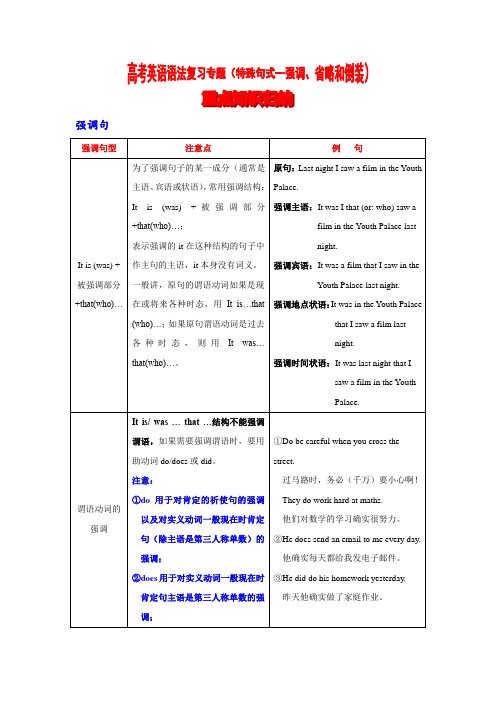
强调句③did用于对实义动词一般过去时肯定句的强调。
It is (was) +被强调部分+that(who)…句型的变式It is (was) + 被强调部分+that(who)…句式基本特征:Is/ Was it +被强调部分+that…;或情态动词+it+ be+被强调部分+ that…①Was it in 1969 ________ the American astronautssucceeded _______ landing on the moon ?A. when; onB. that; onC. when; inD.that; in②Could it be in the restaurant in ______ you haddinner with me yesterday ______ you lost yourhandbag?A. that; whichB. which; thatC. where; thatD. that; where特殊疑问句形式句式基本特征:特殊疑问词+is/was it that…?或特殊疑问词+情态动词+it+be++被强调部分+that…—_______is it _______has made Peter _______heis today?—Determination.A. What; that; thatB. That; that; whatC. What; what; thatD. What; that; what反意疑问句形式句式基本特征:It is/was+被强调部分+that…,isn’t/ wasn’t it?It was Alice and her boyfriend who sent the old manto the hospital, ______?A. do theyB. didn’t theyC. wasn’t itD.was it强调句与其它句型的结合与名词从句的结合句式特征为:整个强调句型用作名词性从句或者在强调句型中含有名词性从句。
英语特殊句式——省略句
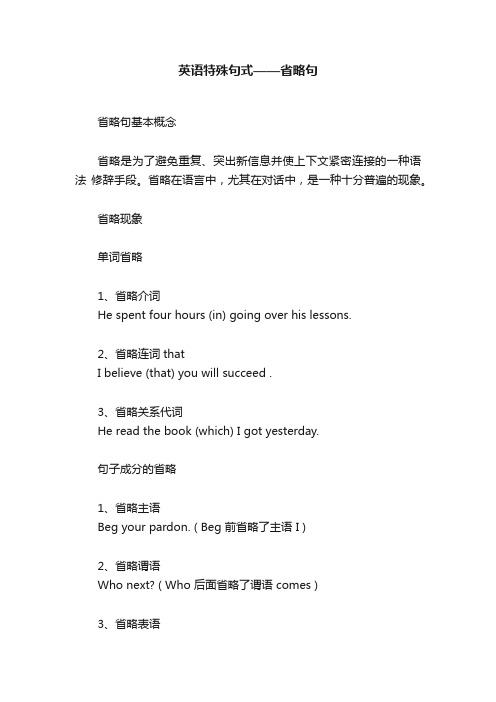
英语特殊句式——省略句省略句基本概念省略是为了避免重复、突出新信息并使上下文紧密连接的一种语法修辞手段。
省略在语言中,尤其在对话中,是一种十分普遍的现象。
省略现象单词省略1、省略介词He spent four hours (in) going over his lessons.2、省略连词thatI believe (that) you will succeed .3、省略关系代词He read the book (which) I got yesterday.句子成分的省略1、省略主语Beg your pardon. ( Beg 前省略了主语 I )2、省略谓语Who next? ( Who 后面省略了谓语 comes )3、省略表语Are you ready? Yes, I am. ( am 后面省略了 ready )4、省略宾语Let ' s do the dishes. I ' ll wash and you ' ll dry. ( wash 和 dry 后面省略了宾语 dishes )5、省略定语He spent part of the money, and the rest he saved. ( the rest 后面省略了定语 of the money )6、省略状语He was not hurt. Strange! ( Strange 前面省略了状语 how )不同句式中的省略1.简单句中的省略:在对话中,交谈双方都知道谈论的对象,则可以省略句子的主语,省略主语和谓语的现象在交际用语中出现的很多。
Sounds like a good idea.2.并列句中的省略:在并列句中,相同的成分如主语,谓语,宾语等都可以省略。
They learn French and we English.3.复合句中的省略:定语从句:That’s the reason he is late for the conference.状语从句:(1)时间状语从句中,省略“主语+be”:When (she was) very young,she began to learn to play the violin.(2)条件状语从句中,省略“主语+be”:If (he is) given more time, he will do the work better.(3)让步状语从句中,省略“主语+be”:Though (he is) a young man, he has made several inventions. (4)方式状语从句中,省略“主语+be”:She talked to the stranger as if (she were) absent-minded.(5)比较状语从句省略相关成分:由than或as引导的比较状语从句,在意义明确的情况下,可以省略than或as后面的相应部分,这一点与上述情况不同。
特殊句式之省略句2(动词不定式的省略)---2021年高考一轮复习英语句法(含解析)
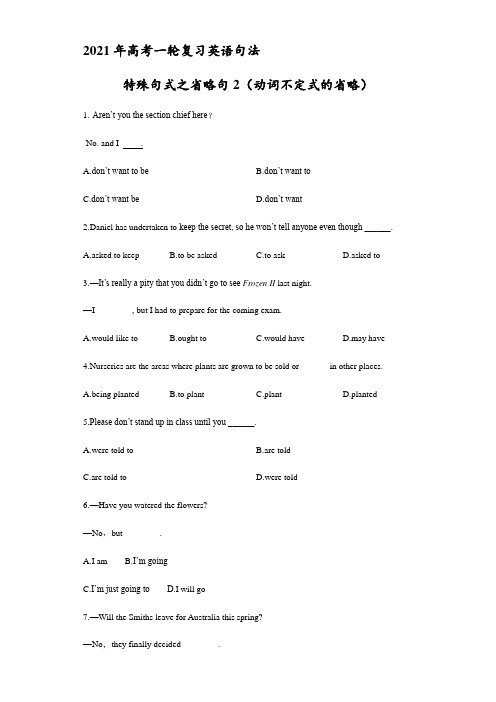
2021年高考一轮复习英语句法特殊句式之省略句2(动词不定式的省略)1.-Aren’t you the section chief here?-No. and I .A.don’t want to beB.don’t want toC.don’t want beD.don’t want2.Daniel has undertaken to keep the secret, so he won’t tell anyone even though ______.A.asked to keepB.to be askedC.to askD.asked to3.—It’s really a pity that you didn’t go to see Frozen II last night.—I ________, but I had to prepare for the coming exam.A.would like toB.ought toC.would haveD.may have4.Nurseries are the areas where plants are grown to be sold or ______ in other places.A.being plantedB.to plantC.plantD.planted5.Please don’t stand up in class until you ______.A.were told toB.are toldC.are told toD.were told6.—Have you watered the flowers?—No,but ________.A.I amB.I’m goingC.I’m just going toD.I will go7.—Will the Smiths leave for Australia this spring?—No,they finally decided ________.A.not to leaveB.not leavingC.not toD.not to be leaving8._____ on smart phone to entertain themselves ______________ know what to do while going out without it.A.Such does the dependence; as not toB.Such dependence does; to notC.So dependent are they; as not toD.So do they depend; not to9.The boss asked Tim to go and out if there was anyone else absent.A.findB.findingC.to findD.found10.Tom told the news to everybody in the classroom. Why didn’t you tell him _______?A.not to be doneB.not do itC.not toD.do not to11.—Why didn’t you turn up at the opening ceremony? I was waiting for you all the time.—I . But I had some urgent business to deal with then.A.would like toB.would like to haveC.would like to beD.would like to have attended12.The driver stopped the car a cat across the street.A.to let; to walkB.letting; walkC.letting; walkingD.to let; walk13.—What’s your dream?—Well, my parents wouldn’t expect me to be a banker, but I still.A.hope toB.hope soC.hope notD.hope for14.Are you chairman? --- No, and I _________.A.don’t want toB.don’t wantC.don’t want to beD.don’t want be15.The boy wanted to ride his bicycle in the street, but his mother told him_____.A.not to doB.not toC.not did itD.don’t do it16.I can’t imagine what air we would be breathing in if we __________ anything to stop air pollution.A.hadn’t doneB.didn’t doC.haven’t doneD.don’t do17.—Mr. Scott has received the invitation to his ex-girlfriend’s wedding ceremony this weekend. Will he attend it?—No, he has finally decided _____.A.notB.not toC.not to goD.not to go to18. —Hi, are you a student of this University?—No, but I ________.A.want toB.want to beC.want soD.want it19.It is believed that life in the twenty--first century is much easier than ________ .A.that used to beB.it is used toC.it was used toD.it used to be20.Johnny wanted to ride his new bicycle in the street, but his mother told him _____.A.not toB.not do itC.not to doD.do not21. The driver wanted to park his car near the roadside but was asked by the police ______.A.not to doB.not doC.not toD.do not22.(2013·新课标全国卷Ⅰ)The driver wanted to park his car near the roadside but was asked by the police ________.A.not to doB.not toC.not doD.do not23.— Would you please join us in this computer game?—Thank you, but I’d rather________.A.not toB.not joinC.not doD.not24.He is taller than he .eded to beed toed to do25.-You seem to know little about Yancheng Middle School. Aren’t you a teacher here?-No, but I ________.A.hope toB.hope thatC.hope itD.hope to be26.---Are you a teacher?---No, but I ________.ed toB.was used toed to beed to do27.We were told not to touch the equipment in the laboratory unless ________.A.allowed to doB.allowing to doC.allowed toD.allowing to28.----Will you go home tomorrow evening?----No, I’m going to a lecture, or at least I’ m planning _________.A.toB.soC.thatD.it29.— Who are you going to have _______ this letter for you? — My secretary.A.typeB.typedC.been typedD.been typing30.I’m sorry if I hurt your feelings. I didn’t _______.A.expect toB.mean toC.do thatD.hope so31.–What’s the matter with Della?–Well, her parents wouldn’t allow her to go to the party, but she still _________.A.hopes toB.hopes soC.hopes notD.hopes for答案与解析1.A【详解】考查省略句。
核心句法(五)特殊句式——强调、倒装、省略
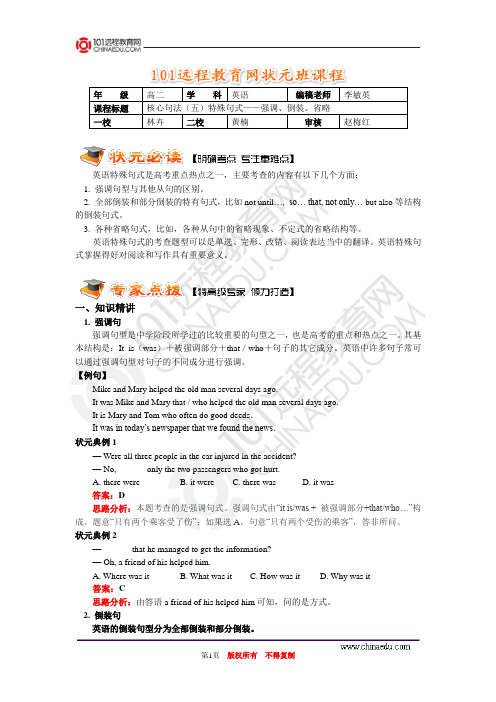
年级高二学科英语编稿老师李敏英课程标题核心句法(五)特殊句式——强调、倒装、省略一校林卉二校黄楠审核赵梅红英语特殊句式是高考重点热点之一,主要考查的内容有以下几个方面:1. 强调句型与其他从句的区别。
2. 全部倒装和部分倒装的特有句式,比如not until…, so… that, not only… but also等结构的倒装句式。
3. 各种省略句式,比如,各种从句中的省略现象、不定式的省略结构等。
英语特殊句式的考查题型可以是单选、完形、改错、阅读表达当中的翻译。
英语特殊句式掌握得好对阅读和写作具有重要意义。
一、知识精讲1. 强调句强调句型是中学阶段所学过的比较重要的句型之一,也是高考的重点和热点之一。
其基本结构是:It is(was)+被强调部分+that/who+句子的其它成分。
英语中许多句子常可以通过强调句型对句子的不同成分进行强调。
【例句】Mike and Mary helped the old man several days ago.It was Mike and Mary that / who helped the old man several days ago.It is Mary and Tom who often do good deeds.It was in today’s newspaper that we found the news.状元典例1— Were all three people in the car injured in the accident?— No, ______ only the two passengers who got hurt.A. there wereB. it wereC. there wasD. it was答案:D思路分析:本题考查的是强调句式。
强调句式由“it is/was + 被强调部分+that/who…”构成。
题意“只有两个乘客受了伤”;如果选A,句意“只有两个受伤的乘客”,答非所问。
倒装句与省略句的区别及用法解析

倒装句与省略句的区别及用法解析倒装句和省略句是英语语法中常见的两种特殊句式。
它们的运用可以增加句子的多样性,使语言更加丰富,并帮助我们有效地表达思想。
本文将分析倒装句与省略句的区别,并介绍它们的用法。
一、倒装句倒装句是指在句子中调整主语和谓语的位置,通常有两种情况:完全倒装和部分倒装。
1. 完全倒装完全倒装句的结构为:助动词/情态动词/系动词 + 主语 + 谓语。
常见的倒装情况包括以下几种类型:1.1 肯定形式的完全倒装例如:- "Not only did he finish the project ahead of schedule, but he also exceeded our expectations." (他不仅提前完成了项目,而且超出了我们的预期。
)- "Rarely have I seen such a beautiful sunset." (我很少见到如此美丽的日落。
)1.2 否定形式的完全倒装例如:- "Never have I seen such a funny movie." (我从未见过这么有趣的电影。
)- "Little did they know what awaited them."(他们并不清楚等待他们的是什么。
)1.3 倒装的条件句例如:- "Had I known about the event, I would have attended." (要是我早知道这个事件,我就去参加了。
)2. 部分倒装部分倒装句是指将助动词/情态动词/系动词置于主语前,而谓语动词保持不变。
常见的部分倒装情况有以下几种类型:2.1 含有"only, hardly, rarely, seldom"等副词修饰状语从句的部分倒装例如:- "Only in this way can we achieve success." (只有通过这种方式,我们才能取得成功。
省略、强调、倒装句
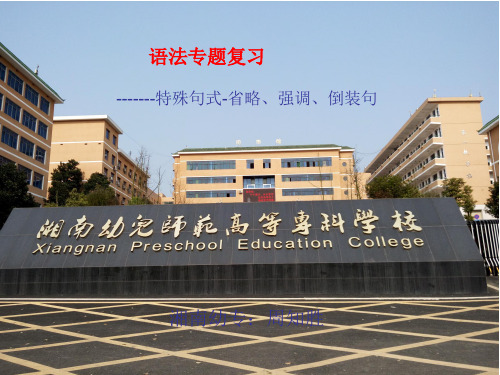
强调句巩固 1 . 强 调句 型 的基 本 形式 为 It is/was + 被 强调 部 分+ that/who+ 其他成分 被强调部分可以是主语、语和状语等。当强调部分为 “人”时,可用 that 或 who,其他情况下用 that 。 It was in Gr eece that Olympic competition star ted.奥林匹克 竞赛是在希腊开始的。 It was Columbus that discover ed Amer ica. 是哥伦布发现了美洲大陆。
Should it rain tomorrow,what should we do? 明天万一下雨,我们怎么办? 注意: 当if省略时,需用倒装语序(一般疑问句语序)。
要点4 不定式符号to 从句中不定式符号to后,常省略上文提到的不定式, 如: I went there because I want to(go there). 因为我 He didn't come to the meeting though he promised to(come). 他没来参加会议 ,尽管他许 诺说要来的。 --Do you want to come with me? 你想和我一起去 么? --I'd like/love to.
4) 由连接代词、连接副词引导的宾语从句,常在上下文 清楚的情况下省去从句。 Tom has gone,but no one knows where(he was gone). 汤姆走了,但没人知道他 到哪里去了。 Some one took my dictionary,but I don't know who(took my dictionary). 有人 拿了我的辞典,但我不知道是谁。 注意: 要保留连接词。 5) 虚拟条件从句中连词if的省略。 Were they here,they would help us. 如果他们在这里,他 Had I left earlier,I would have caught the train.
特殊句式之倒装句以及省略句讲义
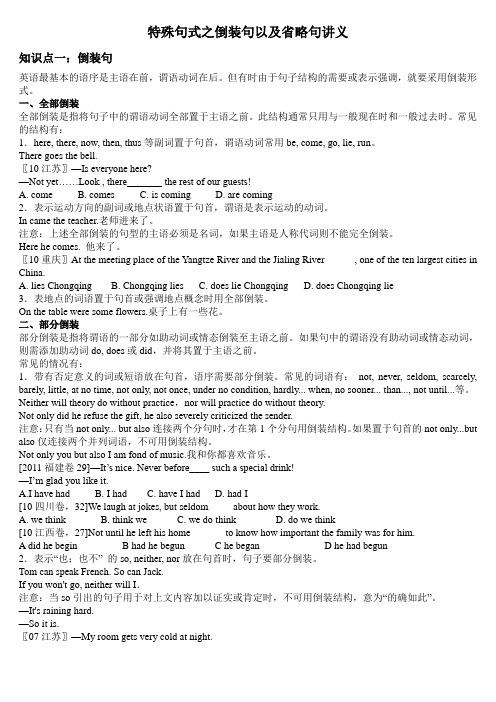
特殊句式之倒装句以及省略句讲义知识点一:倒装句英语最基本的语序是主语在前,谓语动词在后。
但有时由于句子结构的需要或表示强调,就要采用倒装形式。
一、全部倒装全部倒装是指将句子中的谓语动词全部置于主语之前。
此结构通常只用与一般现在时和一般过去时。
常见的结构有:1.here, there, now, then, thus等副词置于句首,谓语动词常用be, come, go, lie, run。
There goes the bell.〖10江苏〗—Is everyone here?—Not ye t……Look , there_______ the rest of our guests!A. comeB. comesC. is comingD. are coming2.表示运动方向的副词或地点状语置于句首,谓语是表示运动的动词。
In came the teacher.老师进来了。
注意:上述全部倒装的句型的主语必须是名词,如果主语是人称代词则不能完全倒装。
Here he comes. 他来了。
〖10重庆〗At the meeting place of the Yangtze River and the Jialing River______, one of the ten largest cities in China.A. lies ChongqingB. Chongqing liesC. does lie ChongqingD. does Chongqing lie3.表地点的词语置于句首或强调地点概念时用全部倒装。
On the table were some flowers.桌子上有一些花。
二、部分倒装部分倒装是指将谓语的一部分如助动词或情态倒装至主语之前。
如果句中的谓语没有助动词或情态动词,则需添加助动词do, does或did,并将其置于主语之前。
常见的情况有:1.带有否定意义的词或短语放在句首,语序需要部分倒装。
8.3省略句
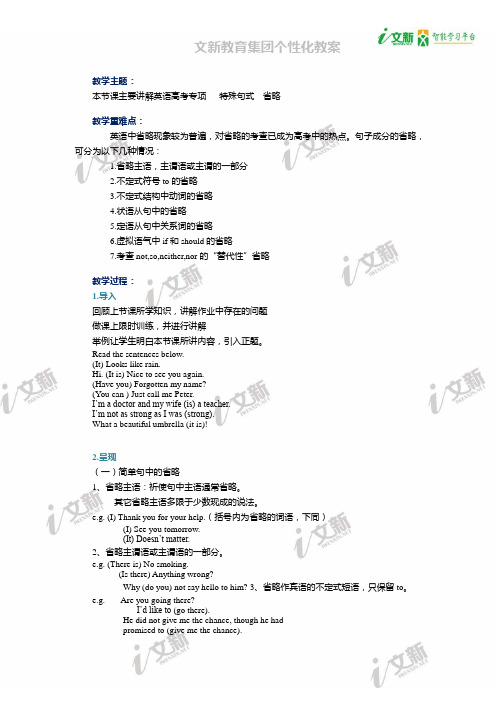
教学主题:本节课主要讲解英语高考专项特殊句式省略教学重难点:英语中省略现象较为普遍,对省略的考查已成为高考中的热点。
句子成分的省略,可分为以下几种情况:1.省略主语,主谓语或主谓的一部分2.不定式符号to的省略3.不定式结构中动词的省略4.状语从句中的省略5.定语从句中关系词的省略6.虚拟语气中if和should的省略7.考查not,so,neither,nor的“替代性”省略教学过程:1.导入回顾上节课所学知识,讲解作业中存在的问题做课上限时训练,并进行讲解举例让学生明白本节课所讲内容,引入正题。
Read the sentences below.(It) Looks like rain.Hi. (It is) Nice to see you again.(Have you) Forgotten my name?(You can ) Just call me Peter.I’m a doctor and my wife (is) a teacher.I’m not as strong as I was (strong).What a beautiful umbrella (it is)!2.呈现(一)简单句中的省略1、省略主语:祈使句中主语通常省略。
其它省略主语多限于少数现成的说法。
e.g. (I) Thank you for your help.(括号内为省略的词语,下同)(I) See you tomorrow.(It) Doesn’t matter.2、省略主谓语或主谓语的一部分。
e.g. (There is) No smoking.(Is there) Anything wrong?Why (do you) not say hello to him? 3、省略作宾语的不定式短语,只保留to。
e.g. ---- Are you going there?---- I’d like to (go there).He did not give me the chance, though he hadpromised to (give me the chance).(动词:want, wish, expect, hope, like, love, try, forget, decide,prefer, mean, intend, plan, refuse…等动词宾语。
